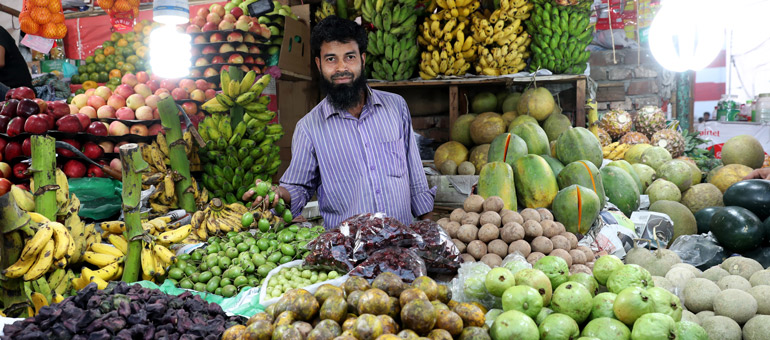In a commendable move to combat the effects of COVID-19, the Government of Bangladesh has announced a bailout package to support Small and Medium Enterprises (SMEs) by partially covering their interest payments for the current fiscal year until 30th June 2020.
But the eventual impact of COVID19 pandemic and its potentially devastating impact on food systems, especially on the SMEs that are the backbone of food supplies, are going to be far reaching. Food producing SMEs across Bangladesh will undoubtedly be badly impacted. What do we know about what is happening?
The early data is worrying. The poultry industry alone has seen an estimated loss of 11.5 billion taka (USD 135 million) and the production of poultry and fish feed fell by 75% after COVID19 hit Bangladesh. The dairy sector is losing around 570 million taka (USD 6.7 million) each day, with 12 to 15 million litres of milk being left to spoil. The estimated loss of the agriculture sector could be about USD 630 million, and the hotels and restaurant related services could lose USD 510 million. The sea food industries have almost been wiped out as losses in the crab industry alone have reached USD 46.9 million. SMEs make up almost 70% of these industries, and this poses a great risk to the food system of Bangladesh as SMEs struggle to navigate the impact of COVID19 on their businesses.

Food producing SMEs across Bangladesh will undoubtedly be badly impacted. What do we know about what is happening? © GAIN / Yousuf Tushar
There is also a risk that a large segment of the population may fall back into the nutrition poverty trap. Without adequate nutrition, or without being able to meet minimum nutritional requirements, the vulnerability of the low income population to diseases will be increased, lowering productivity that might pull people into deeper levels of poverty.
In such a situation, only the government has the means to find ways to provide special support services to SMEs so that they can revamp their supply, distribution and services of nutritious and safe food. The government of Bangladesh has pledged to distribute food to targeted low income groups for up to six months and will also initiate selling rice at Tk 10/kg (USD 0.12). These safety net programmes need wider expansion and should also be broadened to include support to SMEs.
Protecting and stimulating key nutritious foods will be critical. From issues affecting production to transport, the food reaching wet markets has tangibly reduced and will be further reduced if SMEs and farmers are not incentivised and supported. SMEs in the food & beverage sector are in urgent need of forward contracts at a predetermined fair price, which the government can facilitate within clusters of SMEs as categorized by the SME Foundation. This will mitigate losses of perishable food products and keep SMEs in business without disrupting food supplies. SMEs also need much broader financial packages, such as soft microcredit schemes to inject cash to reemploy workers and working capital support. Finally, the government can diversify its food package to include products like milk, perishable vegetables etc. to ensure better nutrition of the vulnerable population and to revamp production by SMEs.
This pandemic is a critical moment for the government to translate its commitments for nutrition into actions to ensure the availability, accessibility and affordability of nutritious and safe food . In this regard, the Scaling Up Nutrition (SUN) Business Network (SBN) is the private sector platform for the SUN Movement. SUN is a Global Movement, led by governments to realise the vision of a world without hunger and malnutrition, with the support of civil society, the United Nations, donors and businesses. Bangladesh was one of the early risers to join the SUN Movement in 2012 under the dynamic leadership of H.E. the Honourable Prime Minister of the People’s Republic of Bangladesh. SBN mobilizes business to act, invest and innovate in responsible and sustainable actions for improved nutrition. SBN Bangladesh is chaired by the Ministry of Industries (MoInd) and co-convened by the Global Alliance for Improved Nutrition (GAIN) and World Food Programme (WFP). SBN strategically supports SMEs through linkages with the nutrition sensitive institutional support system of the government, assisting in Business to Business (B2B) technical assistance through the Global SBN members and strengthening the capacity of SMEs through building nutrition, food safety, business development and finance skills. In addition, SBN Bangladesh recently organized the Bangladesh NutriStar to demonstrate the capacity of SMEs to bring innovation to the food system in Bangladesh by bringing together innovative SMEs to apply for technical and financial assistance prizes.
During the ongoing crisis and the post-COVID19 economic downturn the SBN will keep coordinating support for SMEs, particularly women led SMEs, who will be disproportionately impacted as they balance additional family duties. Keeping businesses afloat will play a critical role in ensuring economic and social harmony in Bangladesh.
These are tough times and we all need to rally together. Government, needs to take quick actions to support food systems albeit it with limited information. There are many priorities but if there is one strategic entry point where one investment can give multiple returns in a relatively short time, I would argue that it is the investment in our food system through SMEs.